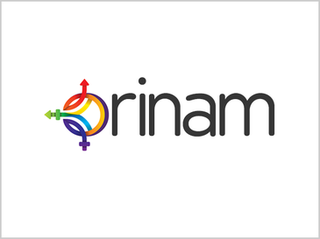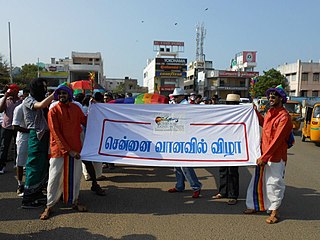Related Research Articles
Homosexuality in India is socially permitted by most of the traditional native philosophies of the nation, and legal rights continue to be advanced in mainstream politics and regional politics. Homosexual cohabitation is also legally permitted and comes with some legal protections and rights.

Sridhar Rangayan is an Indian filmmaker who has made films with special focus on queer subjects. His queer films, The Pink Mirror, Yours Emotionally, 68 Pages, Purple Skies, Breaking Free & Evening Shadows have been considered groundbreaking because of their realistic and sympathetic portrayal of the largely closeted Indian gay community. His film The Pink Mirror remains banned in India by the Indian Censor Board because of its homosexual content.
Pune Pride is an annual LGBT pride parade that was first held in Pune, Maharashtra on 11 December 2011. It is the second Pride parade to be organized in the state of Maharashtra, after the Queer Azaadi Mumbai Pride March.

India has a long and ancient tradition of culture associated with the LGBTQ community, with many aspects that differ markedly from modern liberal western culture.
Queer Azaadi Mumbai Pride March, also called Queer Azaadi March and Mumbai pride march, is an annual LGBTQIA pride parade that is held in the city of Mumbai, capital of Maharashtra, India. It usually begins from Gowalia Tank ending at Girgaum Chowpatty. It, along with the Pride Week, is organized by Queer Azaadi Mumbai, a collective of organizations and individuals working for the rights of LGBTQIA community. The participants of the march include people from the LGBTQIH community as well their "straight allies", from India and outside. In addition to being a celebration of queer pride, the pride march and related events are a platform to ask for equal rights.

Delhi Queer Pride Parade is organised by members of the Delhi Queer Pride Committee every last Sunday of November since 2008. The queer pride parade is a yearly festival to honour and celebrate lesbian, gay, bisexual and transgender people, and their supporters. The parade usually runs from Barakhamba Road to Tolstoy Marg to Jantar Mantar.
Gaylaxy is an Indian lesbian, gay, bisexual and transgender (LGBT) magazine. The magazine is based in Kolkata.
This is a timeline of notable events in the history of non-heterosexual conforming people of South Asian ancestry, who may identify as LGBTIQGNC, men who have sex with men, or related culturally-specific identities such as Hijra, Aravani, Thirunangaigal, Khwajasara, Kothi, Thirunambigal, Jogappa, Jogatha, or Shiva Shakti. The recorded history traces back at least two millennia.
Chennai has LGBTQIA cultures that are diverse concerning- socio-economic class, gender, and degree of visibility and politicisation. They have historically existed in the margins and surfaced primarily in contexts such as transgender activism and HIV prevention initiatives for men having sex with men (MSM) and trans women (TG).

Queer Pride Guwahati was organised for the first time by the members and supporters of the local LGBT community in Guwahati, Assam on 9 February 2014. The Queer Pride Guwahati was the first LGBT Pride in the entire North Eastern India. The Pride is now an annual event.

Orinam is a non-funded, social, and activist collective that works to enhance understanding of alternate sexualities and gender identities among families, communities and society. It was founded in 2003 in Chennai under the name MovenPick and is one of the oldest collective of its kind in India. People affiliated with Orinam are from or trace their ancestry to the following geo-cultural: People of Tamil Origin from Tamil Nadu, India. Orinam provides a platform for creative expression, personal and social commentary by Queer people of Tamil Origin and of Indian Origin primarily. Orinam also acts as a local support group in Chennai for the queer community. Orinam also partners with the city-, state- and national initiatives around decriminalisation of homosexuality by amending Section 377 of the Indian Penal Code and LGBTQ rights.

The Chennai Rainbow Pride March has been held by members of Tamil Nadu LGBTIQA+ communities every June since 2009. The pride march is organised under the banner Tamil Nadu Rainbow Coalition, which is a collective of LGBT individuals, supporters, and organizations working on human rights and healthcare for the LGBTQIA community. The Pride March occurs on the final Sunday of June every year. The Pride March is usually preceded by a month-long series of events organized by NGOs and organizations to inculcate awareness and support for the LGBTQ community, such as panel discussions, film screenings, and cultural performances. The Chennai Vaanavil Suyamariyadhai Perani a.k.a. Chennai Rainbow Self-Respect March is known for being inter-sectional in nature as it addresses issues with multiple axes such as caste, class, religion coupled with gender discrimination.
Kolkata Rainbow Pride Festival (KRPF) is a Kolkata based open collective of individuals, networks and organizations that support LGBT rights. The collective organizes the annual Kolkata Rainbow Pride Walk, which has become the longest-running event of its kind in South Asia.
Kolkata Rainbow Pride Walk (KRPW) is the oldest pride walk in India and South Asia. The first march in Kolkata was organised on 2 July 1999. The walk was called The Friendship Walk. Kolkata was chosen as the first city in India to host the march owing to Kolkata's history of movements for human and Political Rights. Currently, Kolkata Rainbow Pride Walk is organised by the Kolkata Rainbow Pride Festival (KRPF).
The Chandigarh LGBTQ Pride Walk is an annual march held as part of the "Garvotsava" pride week celebrations in Chandigarh, the capital city of the northern Indian states of Punjab and Haryana. The event aims to celebrate and bring together the LGBTQ community and its supporters.
Hyderabad Queer Pride has been celebrated on one of the Sundays in February since 2013. First held on 3 February 2013, Hyderabad became the 12th Indian city to join the queer pride march bandwagon, fourteen years after the first Indian pride march was held in Kolkata. In 2015 it was renamed as Hyderabad Queer Swabhimana Pride, emphasising the self-respect and the acceptance of the community of themselves, as they are. In 2016 it was altered to Hyderabad Queer Swabhimana Yatra and has been retained since.

Bengaluru Namma Pride March is a queer pride march that is held annually in the city of Bengaluru in Karnataka, India, since 2008. The march is organised by a coalition called Coalition for Sex Workers and Sexuality Minority Rights (CSMR). The pride march is preceded by a month of queer related events and activities.

Orange City LGBT Pride March or Nagpur Pride Parade is the pride march organised annually in Nagpur, Maharashtra. It was started in the year 2016. It is a festival to honour and celebrate Lesbian, Gay, Bisexual and Transgender people and their supporters.
The following list is a partially completed compilation of events considered to have a profound effect on the welfare or image of Tamil sexual minorities. The use of bold typeface indicates that the event is widely considered to be landmark:
LGBT Pride marches have been held in the Indian state of Gujarat in various cities since 2013. The first LGBT pride march was held in Surat on 6 October 2013. Since then, pride march in the state has been held in Ahmedabad and Vadodara.
References
- 1 2 3 Gaurav Das. "NE's First Gay Film Festival to screen 10 movies", The Times of India , 10 August 2014
- ↑ Daniel Reynolds, "India's Sodomy Ban Incites 'Day of Rage' Among Activists", The Advocate , 13 December 2013
- ↑ Ishita Bhatia, Soumya Pillai "Protestors mark ‘global day of rage’ against Section 377", The Hindustan Times , 15 December 2013
- ↑ Gaurav Das "First gay rights rally in city", The Times of India , 16 December 2013
- ↑ "LGBTs parade for pride in Guwahati", The Times of India , 10 February 2014
- ↑ Rajiv Konwar "First pride parade in Guwahati- LGBT community marches for life of dignity ", The Telegraph (Calcutta) , 10 February 2014
- ↑ Kumam Davidson "1st LGBT Film and Video Festival of Guwahati to begin on Aug 8", Gaylaxy , 1 August 2014
- ↑ Natalia "How Young “Rainbow Leaders” around the World Fight for Love", The Local , 3 November 2014
- ↑ "India to Witness Historic NorthEast Pride"
- ↑ "Xukia launches Assam’s first multi-lingual LGBTQI publication", Gaylaxy , 4 July 2015